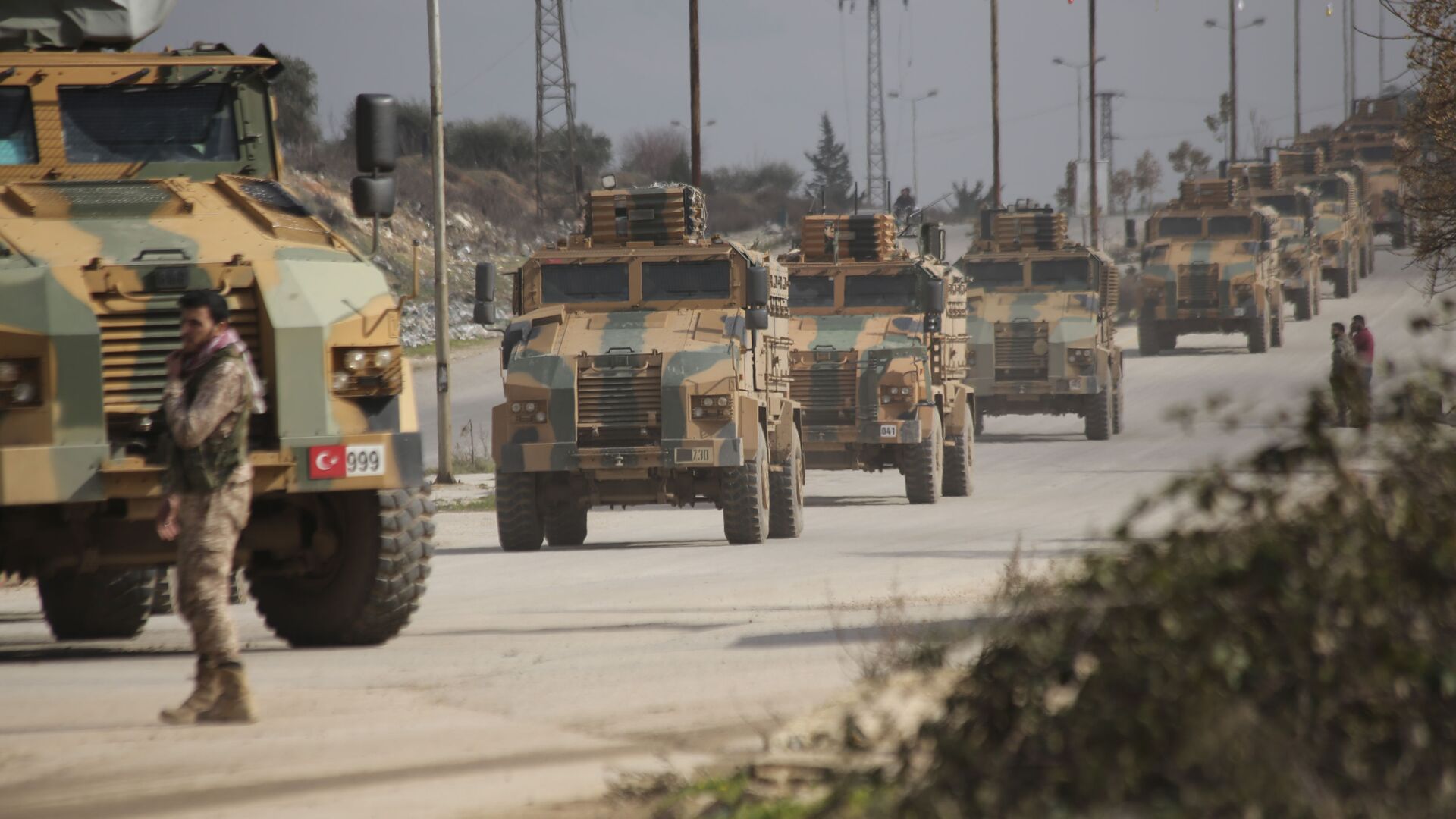https://sputnikglobe.com/20211015/turkish-military-convoy-targeted-in-ied-attack-outside-idlib-injuries-reported-1089957194.html
Turkish Military Convoy Targeted in IED Attack Outside Idlib, Two Soldiers Killed
Turkish Military Convoy Targeted in IED Attack Outside Idlib, Two Soldiers Killed
Sputnik International
According to local reports, a Turkish military convoy in the occupied Idlib governorate was struck by an improvised explosive device (IED) on Friday, with... 15.10.2021, Sputnik International
2021-10-15T19:27+0000
2021-10-15T19:27+0000
2022-12-10T11:35+0000
turkiye
ied
idlib
syria
middle east
https://cdn1.img.sputnikglobe.com/img/07e4/0b/10/1081179040_0:160:3073:1888_1920x0_80_0_0_0f68115fcd7a175f73236b6434478cc0.jpg
The attack reportedly occurred outside the town of Marat Misrin, a town about five miles north of Idlib and 15 miles south of the Turkish border. The area is occupied by several Muslim terrorist groups, including Hay'at Tahrir ash-Sham (HTS)*, which are in rebellion against the Syrian government and which are supported by Turkish military forces.A source with knowledge of the incident told Sputnik that "two soldiers have died and five have been injured."The attack comes a day after the so-called Syrian Salvation Government, which claims to administer the rebel-held territory, arrested an alleged IED maker associated with Ansar Abu Bakr al-Siddiq, an al-Qaeda-aligned group in Idlib that opposes the presence of Turkish troops in the region. The northern territory is the last refuge of the rebel forces that attempted to overthrow Syrian President Bashar al-Assad in a civil war that began in 2011. Many of the groups that fled to Idlib, including those that combined to form HTS, were once supported by the US and its allies as so-called "moderate rebels," despite being current or former affiliates of al-Qaeda.Turkish troops have been in Idlib since 2017, ostensibly as part of a de-escalation operation. In reality it was part of a larger strategy by Ankara to drive Kurdish militias back from the Turkish border and monitor their movements. Subsequent Turkish invasions of northern Syria in 2018 and 2019 drove Kurds further from the border along almost all of the Turkish-Syrian border. Ankara is at the same time opposed to the rule of Assad, and supports his removal from power.* Al-Qaeda and Haya't Tahrir al-Sham (also known as Al-Nusra Front, Jabhat Fatah al-Sham, or al-Qaeda in Syria) are terrorist groups outlawed in Russia and many other states.
turkiye
idlib
syria
Sputnik International
feedback@sputniknews.com
+74956456601
MIA „Rossiya Segodnya“
2021
News
en_EN
Sputnik International
feedback@sputniknews.com
+74956456601
MIA „Rossiya Segodnya“
Sputnik International
feedback@sputniknews.com
+74956456601
MIA „Rossiya Segodnya“
turkiye, ied, idlib, syria, middle east
turkiye, ied, idlib, syria, middle east
Turkish Military Convoy Targeted in IED Attack Outside Idlib, Two Soldiers Killed
19:27 GMT 15.10.2021 (Updated: 11:35 GMT 10.12.2022) According to local reports, a Turkish military convoy in the occupied Idlib governorate was struck by an improvised explosive device (IED) on Friday, with reports suggesting that two Turkish soldiers were killed and another five wounded in the attack.
The attack reportedly occurred outside the town of Marat Misrin, a town about five miles north of Idlib and 15 miles south of the Turkish border. The area is occupied by several Muslim terrorist groups, including Hay'at Tahrir ash-Sham (HTS)*, which are in rebellion against the Syrian government and which are supported by Turkish military forces.
A source with knowledge of the incident told Sputnik that "two soldiers have died and five have been injured."
The attack comes a day after the so-called Syrian Salvation Government, which claims to administer the rebel-held territory, arrested an alleged IED maker associated with Ansar Abu Bakr al-Siddiq, an al-Qaeda-aligned group in Idlib that opposes the presence of Turkish troops in the region.
The northern territory is the last refuge of the rebel forces that attempted to overthrow Syrian President Bashar al-Assad in a civil war that began in 2011. Many of the groups that fled to Idlib, including those that combined to form HTS, were once supported by the US and its allies as so-called "moderate rebels," despite being current or former affiliates of al-Qaeda.
Turkish troops have been in Idlib since 2017, ostensibly as part of a de-escalation operation. In reality it was part of a larger strategy by Ankara to drive Kurdish militias back from the Turkish border and monitor their movements. Subsequent Turkish invasions of northern Syria in 2018 and 2019 drove Kurds further from the border along almost all of the Turkish-Syrian border. Ankara is at the same time opposed to the rule of Assad, and supports his removal from power.
* Al-Qaeda and Haya't Tahrir al-Sham (also known as Al-Nusra Front, Jabhat Fatah al-Sham, or al-Qaeda in Syria) are terrorist groups outlawed in Russia and many other states.

